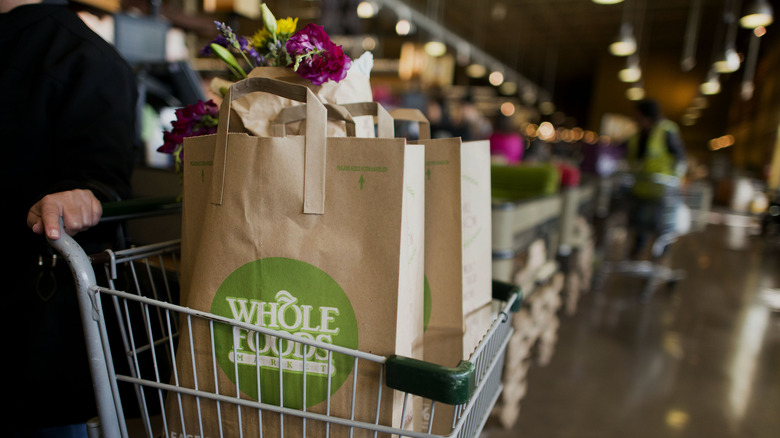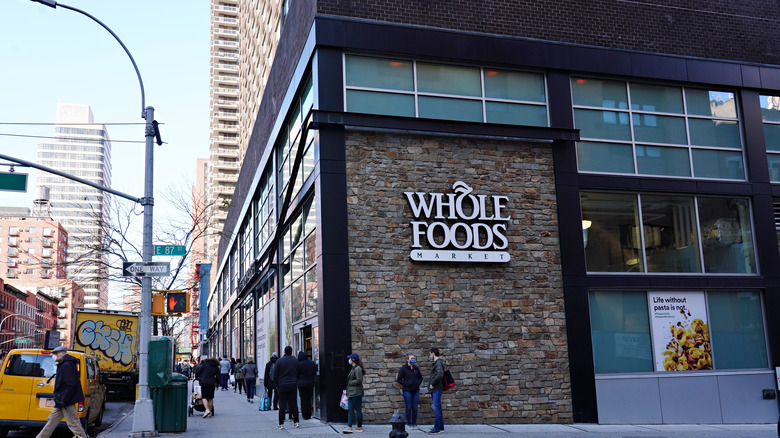Whole Foods Is Closing Multiple Stores And Shoppers Are Upset
When a new grocery store opens in town, shoppers excitedly anticipate new products, perhaps a larger vegan selection, and, dare we say, better prices. When a new Whole Foods opens, however, customers know they are getting at least two of the above, along with more organic and gluten-free choices.
It's these for these reasons that, for a while, Whole Foods took America by storm. According to the grocery chain's website, the company moved beyond its humble beginnings in Texas by expanding to New Orleans in 1988 and then to the West Coast in 1989. By 2001, the chain found itself in business across the country, having picked up some serious attention from its Manhattan location. Fortune reports that the store's spread coincides with its market ranking, which has rapidly ascended since 2004.
While the grocery empire could continue to climb the ranks, not everything is as perfect as it seems. MarketWatch found that Whole Foods' business model presents a problem for its parent company, Amazon. Physical retail business has proven to be an issue for the e-commerce firm, and due to a variety of issues, Whole Foods has seen a fall in profits as of 2021. The issue continues to plague the chain, and it now looks like Whole Foods plans to close down some of its stores.
Six Whole Foods locations are closing across the U.S.
CBS News found that a beloved Whole Foods location in the Englewood neighborhood of Chicago plans to shut down, raising tensions among shoppers in an area that was once classified as a "food desert." Another Chicago Whole Foods in the DePaul University Welcome Center in Lincoln Park will also be closing. While the city does have more Whole Foods locations than others, losing these two is making some residents unhappy. NBC Chicago interviewed Englewood shoppers, and their feelings about the closures can be summed up with one person's statement: "We get something positive and something nurturing into the community and for some reason, it leaves."
A spokesperson for Whole Foods defended the company's decisions, saying that the chain keeps an eye on how stores perform, and, as a result, the company plans to shutter a total of six underperforming stores nationwide. WKRG reports that along with its Chicago locations, the chain plans to close two of its grocery stores in Mobile and Montgomery, Alabama, alongside others in Tarzana, California, and Brookline, Maine. The news has rippled through communities across the country, leaving consumers in the affected areas upset.
Shoppers react across social media
Whole Foods patrons across Alabama gathered on social media to lament the loss of the Whole Foods stores in their area. One Reddit thread noted that the loss of these locations felt like a long time coming, as they mainly serviced a higher-end clientele and had to compete with a variety of equally nice grocery chains. A different Redditor noted that the disappearance of the store could be a sign that other high-end businesses and restaurants could close in the area. One commenter got a good look on how the store closures went down on the inside; allegedly, full-time employees who had heard the news that they would be losing their jobs received a severance, while the part-time employees were given four days' notice to look for new work.
In a separate thread, other Redditors were disappointed about losing access to healthy, specialty, and other items, with one saying that the niche would "ironically" have to be filled by Amazon. Some wondered if a new Amazon store might move in to take Whole Foods' place, but the majority of folks felt like the area won't see a ton of new high-end business in the near future due to its "demographic profile" and lack of disposable income. One user from Montgomery summed things up: "It wasn't a great Whole Foods to be sure, but it was better than nothing."


